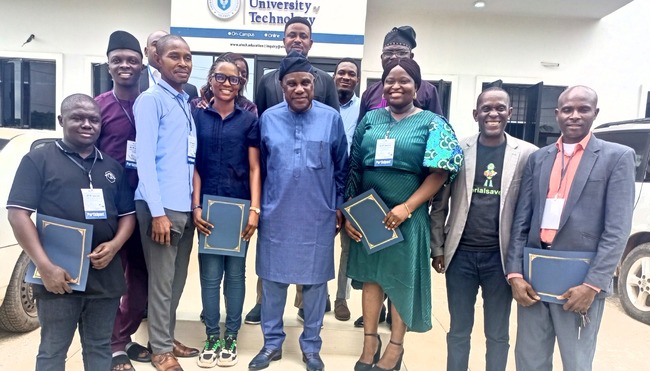The Senate Committee Chairman on Aviation and senator representing Oyo North Senatorial District, Abdulfatai Buhari, has reiterated the need to utilise Artificial Intelligence (AI) technology to reshape and unlock opportunities in the aviation sector.
Senator Buhari noted that with AI, the challenges facing Nigeria’s aviation sector, such as ageing infrastructure, inefficient processes, safety concerns, limited access to global markets and a lack of skilled personnel, can be surmounted through process optimisation, personalisation of customer experience and ultimately generating more revenue.
He stated this on Saturday at a two-day Edge Global Conference organised by the American University of Technology, Ibadan, with the theme ‘AI-Powered Digital Transformation Strategies.’
The lawmaker said, “AI-powered digital transformation offers a beacon of hope, a pathway to overcoming these obstacles and propelling our aviation sector into a new era of efficiency, safety and competitiveness. By harnessing the power of AI, we can optimise operations, enhance safety protocols, personalise customer experiences and unlock new avenues for revenue generation.
“The potential applications of AI in aviation are vast and far-reaching. In air traffic management, AI algorithms can analyse vast amounts of data in real-time, predicting potential conflicts, optimising airspace utilisation and reducing delays. This not only improves the efficiency of our airspace but also enhances safety for all stakeholders.
“In aircraft maintenance, AI-powered predictive analytics can anticipate potential failures before they occur, enabling proactive maintenance and reducing the risk of costly disruptions. This translates to safer skies and more reliable operations for airlines and passengers alike. AI can also be used to optimise the allocation of resources for maintenance, ensuring that the right personnel and equipment are available at the right time and place.
ALSO READ: Adelabu dispels explosion claim in Zungeru Power Plant
“In the realm of customer service, AI-powered chatbots and virtual assistants can provide instant support to travelers, answering queries, resolving issues and personalising their journeys. This not only improves the passenger experience but also frees up human agents to focus on more complex tasks. Furthermore, AI can be used to analyse customer feedback and behaviour, allowing airlines to tailor their services to better meet the needs and expectations of their passengers.
“Moreover, AI can play a crucial role in security screening, analysing passenger data, identifying potential threats and expediting the screening process. This enhances security while minimising inconvenience for travellers. Additionally, AI can be used to monitor and analyse security camera footage, enabling quicker detection and response to potential security breaches.
“In flight operations, AI can optimise flight paths, taking into account weather conditions, airspace restrictions and fuel consumption. This can lead to significant savings in fuel costs and reduced carbon emissions, making the aviation industry more sustainable. AI can also be used to improve the accuracy of arrival time predictions, leading to better planning and resource allocation for airlines and airports.
“The benefits of AI-powered digital transformation extend beyond operational efficiencies. AI can also be used to develop new business models and revenue streams. For example, AI can be used to personalise offers and promotions for passengers based on their past behaviour and preferences. This can lead to increased sales of ancillary services, such as in-flight meals and duty-free items.”
Senator Buhari also noted that for the revolution to be achieved in the sector, there is need for stakeholders to collaborate and create the enabling environment for AI adoption.
He said the areas imperative for actualising the initiative include data sharing and collaboration, skills development, regulatory harmonisation, public-private partnership, research and development and ethical considerations
“We must invest in the necessary infrastructure, including high-speed internet connectivity and data centres to support AI applications. We must also develop a robust regulatory framework that ensures the safe and ethical use of AI in aviation. This framework should address issues such as data privacy, algorithm bias and liability in the event of AI-related incidents,” he added.
NIGERIAN TRIBUNE
